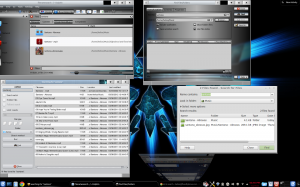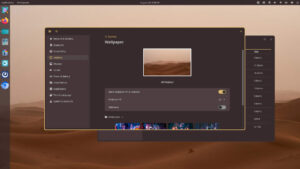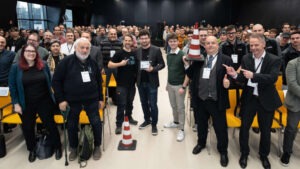Last week, we talked about just how important even your smallest contribution to FOSS might be. It doesn’t matter whether you occasionally spend time in forums helping others or if you submit code for review into the kernel. Everything you do goes into the sand pail. Eventually, everything you do filters down to the place it’s needed most: the everyday computer user.
This could be my sister, your cousin or the guy who bags your groceries at the supermarket…even your doctor. Your contribution benefits tens of thousands of people you will never know, people who will never know you even exist. Thus the beauty of what we do. “We” as in you and I.
 Free open source software.
Free open source software.
From out of this chaos comes a surprising order and opportunity for millions. Free open source software allows us to put meaningful, reliable and no-cost software on every computer wherever we find the need.
That’s not to say that we don’t have our challenges. Now that we’ve discovered just what great work we do, let’s look at some glaring deficits.
First off, this isn’t a nit-picking session. Secondly, there is no singular person or organization being singled out for scrutiny. The things I want to talk about now are things I’ve personally experienced. More importantly, they are things I’ve watched brand new GNU/Linux users experience. Hundreds of them.
They are troublesome in that they exist…some for many years.
Searching for the answer? Reply hazy… Try again.
I have terabytes of data spread across local and network drives I must access on a day to day basis. My lack of organizational skills, coupled with some major league poor planning, has created a horror movie game within my drives. The graphic I might look for in order to accentuate an article may well be found in the files I keep of Wall Street Journal stuff and the joke I call my stock portfolio. With me, ya just never know.
So a good search tool is critical for my workflow. I don’t have time for 8-ball fuzzy responses. I need that file and I need a tool that will find it for me as quickly as possible. For a number of years, I’ve been a Gnome user. The sea change that stunned many of us when KDE hit 4.0 was the reason I jumped the good ship KDE and began to use Gnome. Gnome 2x gave me solid, if not a bit dull, performance and I could live with the drab day-to-day look. When you rely upon your computer for your living, boring is good.
The one thing I could count on with Gnome was the Gnome Search Tool. It didn’t need time to index new files. You add a file to your file system, search for it and BANG, there it is. No hassle, no wait-until-I-finish-indexing nonsense. It gave you the results and a right click within the tool let you do a number of things with that file, such as open it, delete it, move it… You get the picture.
And I know some of you are itching to say…
“But Ken…Ken, just open a terminal and type…”
Remember…eyes of a new user. And besides that…so ok, you find the file by using one of the many command line tools you’ve memorized. Now what? Just wistfully admire the path string? You’re going to want to do something with that file, I am guessing. So what practical use, outside of identifying the physical location of the file, is that going to do for you? You look for something so you can do something with that something, right?
Something like that anyway.

There’s only one problem. Kfind Ksucks.
I’ve played with about every setting you can imagine in Kfind, from the funky default file string to the box that says “use indexing.” It gives me nothing. Nada. Zip. Ziltch.
I illustrate my point by giving you a graphic that indicates perfectly what I mean. I used all four tools on the same file system to search for “santana.” When KFind Kfailed, I remembered an old standby I used when Google dropped support for Desktop Search. Aside from having an ugly name, Catfish is a pretty good tool and it serves files in a no-nonsense, vanilla sort of way. But that’s the key here. It serves your files.
However, even as I lament the lack of a default search tool that works in KDE, Dolphin works extremely well. It’s not as fast and it tends to serve your files in a folder as opposed to individually, but it works and it works well. The problem is, Dolphin isn’t a search tool. It’s a file manager. Computer users want dedicated tools to do their job, not tools that are “also-cans.”
So, I’m a new Linux user and you, my buddy, has put KDE on my computer, patted me on the back and wished me luck.
“So where’s that Moody Blues music on my drive?” I say to myself. “Lemmee search for it.”
Uh-oh.
Did you tell your buddy about Alt F2 before you left him alone with KDE? Of course you didn’t. Did you tell him to use the “find” feature in Dolphin? Of course you didn’t. Did you tell him that the menu search bar can be used to find and execute files? No, but why should you? After all, there’s always KFind. I mean, it’s there to search with, right?
Have you actually used KFind to find a file?
Uh, no. Well at least we’re consistent.
My point through all of this is simple. If stuff is broke, fix it. If it can’t be fixed, let’s re-write it. And if you won’t re-write it, get it the heck out of the system because all you are doing is solidifying in the new user’s mind what his friends are telling him.
“Linux sucks.”
It sucks because it has half-baked, sometimes-working-sometimes-not applications. Of course the new user is going to think Linux sucks. I mean, if I can’t even find a simple file without digging through the menus and trying a half a dozen things…
You know it doesn’t suck and I know it doesn’t suck, but there are hundreds of little problems like this throughout the Linuxsphere. You know what they are. You see them every day. Don’t settle for mediocrity. Just bring it to someone’s attention. Or hell, bring it to mine.
In 2014, I am putting up $2,000.00 of my own money–funds that are being matched by Reglue–to put a bounty out on badly written or non-working software. And I’ll promise you, we will give it to a freelancer before we give it to a project developer, in some cases anyway. The developer has had forever to make fixes and just hasn’t done it. I have found instance after instance of the same complaints about the same broken software repeated in forum after forum. In many cases, no one even bothered to try to help.
Let’s see how some fresh eyes and a bit of cash tackle the problem.
You wanna bet this search thing gets fixed? I KPromise you it will, at least if we have anything to say about it. I believe it’s important enough to spend my time and money fixing…or getting it fixed. If each of us took one of these little problems and helped, it could be a much different Linux landscape.
Or, your project/distro will be updated time and time again with the same broken apps and the same half-finished systems. I say, if just a few of us work on it we can fix this.
Now let’s see, is it grep -r -H “santana” /home/helios/music? Yeah, I think that’s right…no, wait…that can’t be right…
Ken Starks is the founder of the Helios Project and Reglue, which for 20 years provided refurbished older computers running Linux to disadvantaged school kids, as well as providing digital help for senior citizens, in the Austin, Texas area. He was a columnist for FOSS Force from 2013-2016, and remains part of our family. Follow him on Twitter: @Reglue








I’ve just opened KFind and — lo and behold — Works For Me™. From KDE 4.11 on Fedora 19.
As usual the FOSS Force team have hit the nail right on the head. I can think of a few things that while may not be “big” issues..still leave a bad tase in my mouth. (For instance can ANYONE tell me ehy that little icon exists in the far right corner of my Firefox web browser?..and when I highlight it all it does is show some kind of “hit-counter” number? And why even when I right-click on it…select “Customize” from the menu that pops up and REMOVE it from my browser’s bar…is re-appears every time I reopen Firefox?), just quibbles like that, I don’t use KDE, not because I think it sucks, of because I feel that my choice of web browser is “better” or any of the usual suspects, but because to me, and I’m a full blown Linux user, and have been since 2000, it’s just too confusing! I right-click on the desktop I get menu options I’ll never use, and I’m sure there’s a way to remove them, but for the life of me I can’t find it!…but before I turn this into a five page essay of my complaints, I’ll just say “its about time”! LoL!
Cheers!!
I know real Linux men are supposed to hate Unity, but my friends are never left wondering how to search for what they need because Unity puts search at the very center of the UX. And for those that need a full text search tool I install Recoll and its lens on their fresh Ubuntu install before sending back their laptops.
I agree with Ken; unfortunately there are many little (sometimes HUGE) problems on Linux that makes you start thinking about going back to Windows (at least for one second).
And as you said it does hold Linux back… maybe that is why we have many DEs that are kinda half-backed instead of at least one “official” or “stable”.
But the real problems are the HUGE ones like the one I have been struggling with: FSTAB!!!!
Because the Terminal is so powerful (and scary) nobady seems to be thinking about creating tools more automated or with a UI.
Mike, some people report no difficulty at all and that’s what makes this such a frustrating problem.
So on Google Plus, someone mentioned that if you ad an * on each side of the search string, it works nicely.
And after trying it, it most certainly does.
I suppose my problem then wouldn’t be that the software is broken…it’s obviously not.
The software is written by geeks, for geeks. Automate the * in any default search string and you have a nice, working feature. Not one you have to tinker with in order to work.
kfind (and various other search programs) has default search of “exact match”. You put in wildcards to make it “fuzzy”: “word”=exact filename, “word*”=any filename starting with word, “*word”=any filename ending with word, “*word*”=any filename containing the word, “wo?d”=any 4 letter filename starting with wo, having 1 character that can be anything and ends with d, etc.
The others you mention defaults to “fuzzy” search, but I’m sure can also do exact match search, f.e. in catfish, click on the properties(?) symbol at the right of the search-bar and choose “exact match”. Do that and you get the same result as kfind without wildcards.
If this is such a big problem with newcomers, I’d rather question the descision of the distro to make kfind the default search prog instead of a more intuitive (well, for some) search prog, like catfish… but then of course you get the issue with the name *LOL*